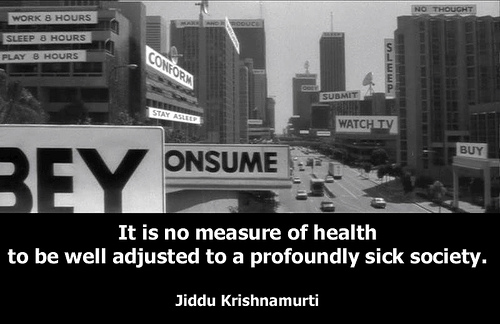Our shopping mall nation of broken spirits
Modern marketplace thinking destroys our sense of community and solidarity, leaving us alone against predators who will do anything for our money. We’re now fiercely individual competitors selling each other memes, tricks, and gimmicks to get ahead of a teeming crowd who might have otherwise been friends and neighbors.
 With the severe economic downturn comes the opportunity to review some of our basic values as a civilization. Utilitarianism cannot work because it is consistently undersupported.
With the severe economic downturn comes the opportunity to review some of our basic values as a civilization. Utilitarianism cannot work because it is consistently undersupported.
This ideology was never needed for having friendships and community. It is after all only such collective solidarity that can both build and maintain a utilitarian ideal.
Diversity makes solidarity more difficult in all things save ruthless commerce. Collective is presently treated as a naughty, unfree word.
As individuals, few people are both mentally wired for charitable compassion and bear the means to deliver this sentiment across a densely populated society.
The greatest good for the greatest number of people has however become a commonplace marketing slogan. Therapeutic solutions abound for what were always ordinary woes in life. It seems no part of our isolated lives is untouched by someone else’s sales pitch.
Even what used to be sacred ideas representing something more important than mankind are infected with marketplace thinking.
We want to show how God meets their needs, makes them happy, and how religion makes them nicer people and how religion will make the world a better place. In other words, we have a marketplace mentality. If we can just show people how great God is and how super dooper religion is we’re sure they’ll buy the product.
Now nothing is higher than mankind, or rather, an individual man’s free pursuit of self-interest. What are considered national heroes easily take a back seat to the struggling financial profiles of millions.
Underfinanced memorial construction for national unity against foreign enemies grinds to a halt. Maybe our economic fixation will help us forget them all so we can get on with our commercial anticulture and individual diversions.
IN September 2004 Gov. James E. McGreevey used a ceremonial shovel to break ground for the New Jersey 9/11 Memorial called “Empty Sky.â€
But more than four years later, little has happened at the 1.6-acre site on the eastern edge of Liberty State Park that is now ringed with an 8-foot fence. Because of a pending legal dispute, a larger-than-expected price tag and a daunting fund-raising challenge, the future of the memorial could even be in doubt.
Americans no longer know who they are. Dwelling in a continental scale shopping center, we are customers and laborers from all corners of the globe, so we are no longer a definite people at all.
We are nothing more than The Haves and The Have Nots, the greatest single social advancement of reductionist modernism under liberal democracy.
The measure could be the nation’s first citywide, non-emergency curfew to include adults, several experts said.
“We’re trying to think outside the box,” said Mayor Jose Torres. “This was triggered predominantly by fear among city residents over the shootings that have been occurring this summer.”
Former assurances of a secure future cannot be delivered upon and everyone knows it. The utilitarian ideal is also set for failure with the decay of social security. Our giant impersonal bureaucracy is unable to deliver us ease in our retirement years in exchange for a life of taxed labor.
Detached social systems reduce living people to records in database entries. These systems are no sure replacement for the role once served by family, friends and close community before the New Deal era.
Social Security is also facing long-term financial problems. The retirement program is projected to start paying out more money than it receives in 2016. Without changes, the retirement fund will be depleted in 2037, according to the Social Security trustees’ annual report this year.
The expense of foreign adventures to maintain our commercial way of life continues. Here we find ourselves in the latest of sixty years of nationally divisive military expeditions abroad.
American spirits have not been overwhelmingly dedicated to the last several foreign adventures for sustaining the modern way of life. Such uniform commitment is however what kept our outgunned opponents from Korea, to Vietnam, to the Middle East tenacious and persistent against us.
Mullen said the security situation in Afghanistan needs to be reversed in the next 12 month to 18 months.
“I think it is serious and it is deteriorating, and I’ve said that over the last couple of years, that the Taliban insurgency has gotten better, more sophisticated,” he said.
Just over 50 percent of respondents to a Washington Post-ABC News poll released this past week said the war in Afghanistan is not worth fighting.

Where did this marketplace thinking that replaced our ages-old native traditions and commitment to our nation come from?
Although we like to think of ourselves as civilised thinkers, we’re subconsciously still driven by an impulse for survival, domination and expansion. This is an impulse which now finds expression in the idea that inexorable economic growth is the answer to everything, and, given time, will redress all the world’s existing inequalities.
The problem with that, according to Rees and Hern, is that it fails to recognise that the physical resources to fuel this growth are finite. “We’re still driven by growing and expanding, so we will use up all the oil, we will use up all the coal, and we will keep going till we fill the Petri dish and pollute ourselves out of existence,” he says.
But there’s another, more recent factor that’s making things even worse, and it’s an invention of human culture rather than an evolved trait. According to Rees, the change took place after the second world war in the US, when factories previously producing weapons lay idle, and soldiers were returning with no jobs to go to.
American economists and the government of the day decided to revive economic activity by creating a culture in which people were encouraged to accumulate and show off material wealth, to the point where it defined their status in society and their self-image.
Rees quotes economist Victor Lebow as saying in 1955: “Our enormously productive economy demands that we make consumption our way of life, that we convert the buying and use of goods into rituals, that we seek our spiritual satisfaction and our ego satisfaction in consumption. We need things consumed, burned up, worn out, replaced and discarded at an ever-increasing rate”.
Where is this liberal democratic progress taking us in the next 10 to 20 years?
28 minute video Nils Gilman: The Global Illicit Economy
Tags: consumerism, identity









